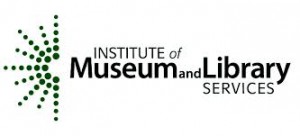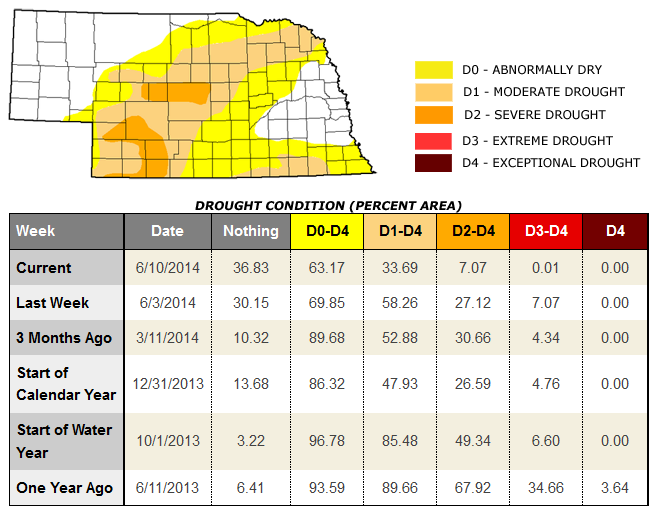Search the Blog
Categories
- Books & Reading
- Broadband Buzz
- Census
- Education & Training
- General
- Grants
- Information Resources
- Library Management
- Nebraska Center for the Book
- Nebraska Libraries on the Web
- Nebraska Memories
- Now hiring @ your library
- Preservation
- Pretty Sweet Tech
- Programming
- Public Library Boards of Trustees
- Public Relations
- Talking Book & Braille Service (TBBS)
- Technology
- Uncategorized
- What's Up Doc / Govdocs
- Youth Services
Archives
Subscribe
Category Archives: What’s Up Doc / Govdocs
Congress Passes Legislation Recognizing Libraries in Workforce Development
Congress recently took a giant leap forward to improve the delivery of job training and workforce development by passing the Workforce Innovation and Opportunity Act of 2014 (WIOA). Overwhelmingly approved by both the House and the Senate and supported by the President, the legislation is the result of a bipartisan agreement that recognizes the vital role our government plays in providing the services and resources job seekers need to access the kinds of skills training, career information, and education that are required for today’s job market.
The bill includes several exciting changes that update past workforce development laws and better coordinate federal resources by modernizing job training and identifying strategic workforce investments. IMLS has long recognized and supported the services libraries provide to help the American workforce rebound. And it is especially gratifying to see lawmakers from both sides of the aisle acknowledge the essential connection of public libraries to communities as career improvement partners in WIOA.
For public libraries, the new bill identifies them as eligible for funds as One-Stop partners with the ability to provide an expansive array of job search services. Also, it recognizes libraries as important providers of federally supported training and employment services for adult education and literacy. The legislation instructs State and Local Workforce Development Boards to boost “digital literacy skills” at training centers—the very definition of “digital literacy” originates from the law that created IMLS and is referenced in WIOA!
We are delighted that the public library’s role in improving our workforce development system has been acknowledged. IMLS will continue to support this work with public and private partnerships and grants. As an example, we recently partnered with the U.S. Department of Education’s Office of Career, Technical and Adult Education (OCTAE) to assist the estimated 3 million Americans who are seeking access to federal job information, education, and training by connecting them through resources at their public libraries. We are also partnering with the U.S. Department of Labor Employment and Training Administration (ETA) to highlight effective practices and encourage additional collaboration between the workforce investment system and public libraries.
Every day, people in communities across the U.S. are using libraries to access the Web for career development—participating in GED institutes, improving their English literacy and digital literacy, and finding work.
We applaud Congress, especially longtime library supporters Sen. Jack Reed (R.I.) and Rep. Rush Holt (NJ), on passing the Workforce Innovation and Opportunity Act of 2014 and for President Obama’s continued leadership in assisting American workers and employers. We also thank them for what it will do to serve our nation’s job seekers and help libraries be better equipped to contribute to the country’s economic vitality.
**By Susan H. Hildreth, Director, IMLS. Reprinted from UpNext: The Official Blog of the Institute of Museum and Library Services, July 16th, 2014.
Doc Spot: Lincoln and His Printers : GPO in the Civil War
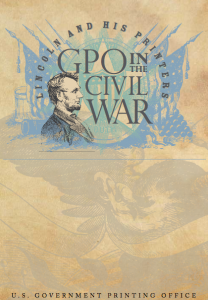 The U.S. Government Printing Office (GPO) first began operations on March 4, 1861, the same day as President Abraham Lincoln’s inauguration. The GPO set up shop in a printing plant originally built by Cornelius Wendell, a longtime contract printer for Congress. Located at the corner of North Capitol and H Streets NW, the facility was the largest printing plant in Washington and one of the largest in the U.S. at that time.
The U.S. Government Printing Office (GPO) first began operations on March 4, 1861, the same day as President Abraham Lincoln’s inauguration. The GPO set up shop in a printing plant originally built by Cornelius Wendell, a longtime contract printer for Congress. Located at the corner of North Capitol and H Streets NW, the facility was the largest printing plant in Washington and one of the largest in the U.S. at that time.
The first head of the GPO was John D. Defrees, an Illinois newspaper publisher, politician, and friend of President Lincoln. With the outbreak of the Civil War, the GPO grew rapidly to keep pace with military and civilian printing needs. In 1864, GPO employees participated more directly in the war when Company F of the Interior Department Regiment, comprised of GPO printers and pressmen, marched into Northwest Washington to help repel Confederate forces under General Jubal Early.
Lincoln and His Printers : GPO in the Civil War is a brochure published by the GPO to accompany an exhibit of the same name. It is a short history of the GPO during the Civil War years, and includes pictures of some of the people, buildings, and documents (including the Emancipation Proclamation) that were most important during the early years of the GPO. Click on the title above to view the full-text online, or visit the Nebraska Library Commission to find this and many other state and federal documents.
Small Business Administration at work in Nebraska…
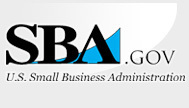 Nebraska beef plant reopens, creates jobs thanks to SBA International Trade Loan financing
Nebraska beef plant reopens, creates jobs thanks to SBA International Trade Loan financing
For five years, the meatpacking plant in this part of ranch country in northwest Nebraska stood vacant and silent. Now, thanks in part to new owners and SBA financing, the plant has re-opened as a supplier for organic, natural grass-fed, premium and halal beef for domestic and overseas markets, and given a small town a big economic jolt.
Open Range Beef purchased the shuttered plant from the city of Gordon in late June 2013, and have spent the last few months upgrading the operation with state-of-the-art equipment and material. With the purchase and re-opening, the business also created 100 new jobs, said co-owner Pat Shudak (pictured, left), a big deal for a town of around 1,800 people.
The company was approved for $3.8 million in financing in April using the SBA’s International Trade Loan program, one of only four guaranteed loans of this type in the four-state region this fiscal year. 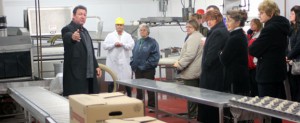
The 36,000-square foot plant expects to hit a target of 250-300 head of cattle per day, or about $120 million worth of cattle per year, from local ranchers for its USDA-certified beef processing operation. Open Range Beef chiefly will serve Rastelli Foods, a New Jersey-based humane and sustainable agricultural company with high-end clients in both domestic and overseas markets.
Serving as a hub for specialty and organic meats for export, the company had to buy more expensive equipment such as hot water to clean carcasses, and follow strict guidelines. For example: there’s a long list of specific requirements for meat to be certified halal if it’s to be exported to Muslim customers.
“We’ll be sending beef to Japan, Hong Kong, the Middle East, Europe,” Shudak added. “The qualifications and restrictions are long; some dictate cattle only be 30 months or younger, and some countries don’t allow importing certain parts, such as livers, kidneys and parts outside the main cuts of meat. Each country’s certification is different.”
Because the plant is mid-sized, explained co-owner Jill Noetzelman, “we can switch gears whenever we need to for custom slaughtering, which benefits meat producers and the packer,” a competitive advantage over bigger plants, such as those which process up to 5,000 head of cattle a day. Those enormous operations leverage economies of scale with relatively inflexible work flows can’t allow for smaller, specialty orders.
As a result, Shudak claimed, Open Range Beef’s operation expects to have a direct positive impact of nearly $5 million a year and an overall economic impact of $22 to 25 million a year for the area.
“We also purchase our supplies as much as possible locally from retail, lumber yards and hardware stores,” Noetzelman said, a move which generates significant secondary economic benefits for the town from the plant’s presence.
“It’s too soon to say what our revenues look like,” Shudak added. But the outlook is bright: “The cattle market was at an all-time high when we took over, and it’s even looking a lot better now.”
Ranchers also will benefit with Open Range Beef’s location: the next closest packing plants for livestock producers in the area are Lexington and Hastings, Neb., and Fort Morgan, Colo., some hundreds of miles away.
Shudak said the ownership team moved from building a solar development company in Hawaii as part of its investment portfolio to the specialty beef industry after a high school friend of Shudak’s mentioned he had considered going into the fast-growing specialty beef business. Private equity supplied the financing to purchase the plant, but the team needed more for the equipment, operating capital and cattle purchases.
“This wasn’t a conventional loan like for a retail or storefront business,” Noetzelman said. So they turned to BizCapital, a multi-state lender which offers competitive loans to small- and medium-sized companies located in underserved markets, and one of Missouri’s Lenders of the Year for 2012, and First Bank of the Lake, an Ozarks-based lender experienced with SBA applications. With their help over the six-month application process, Open Range Beef was approved for $3.8 million in financing in April 2014 using the SBA’s International Trade Loan program, one of only four guaranteed loans of this type in the four-state region this fiscal year. This program which offers a 90 percent guarantee to the lender, offers access to capital for a small business in a position to expand existing export markets or develop new export markets.
“I don’t believe we would have put this together without the SBA,” Shudak said. “The nice thing is that we had a lot of equity in this plant and had real strong appraisals. In approving our loan, the SBA focused on job creation, helping the local economy, exporting, things that really matter to our business. Without the SBA, we found banks weren’t keen on certain businesses, and packing houses were one of them.”
And for a good reason: the business of beef harvesting and processing industry is cash-intensive and a volatile commodity-based one.
Shudak said future plans call for expansion of the plant’s cooler space and adding more jobs as the company’s capacity grows.
“The majority of our employees we have now we first hired at the beginning for construction work during the renovation,” Shudak said. “When we started the remodeling there was a real lack of available construction crews in the area, so we brought in a construction manager and hired former plant workers and trained them.”
When they finished the construction work, those same employees put down their hammers and put on their frocks, and Shudak noticed “there’s a huge amount of pride in the building, because they did the work to bring it back.”
While the town’s residents, along with members from the nearby Oglala Sioux Tribe reservation, who filled many plant positions in the past, make for a healthy labor pool, the plant’s promised growth is enough so a challenge for Gordon’s city manager is to address potential housing shortages incoming workers likely are to face.
Open Range Beef also points to the area’s diverse work force as a benefit, with Native American, African-American, and Guatemalan and other Hispanic employees of all working ages on staff, and young professionals in the area also seeking to be part of the business.
“You know, our philosophy coming into the business here is that you treat your employees like family, appreciate each individual, and create the positive work environment where employees who spent 8-10 hours a day here want to come to work here,” Noetzelman said.
Reprinted from SBA.gov. For more information about the U.S. Small Business Administration. and how it’s loans and grants can help, visit SBA.gov/Loans & Grants.
Nebraska Sesquicentennial Commission
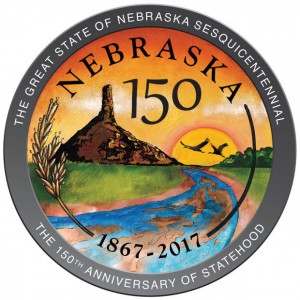 One of the new Nebraska laws going into effect today, July 1st, 2014, will create a state Sesquicentennial Commission to plan for Nebraska’s 150th anniversary as a state in 2017. The Nebraska Sesquicentennial Commission will consist of 17 members appointed by the governor. Starting today, Gov. Dave Heineman will have 60 days to appoint the members.
One of the new Nebraska laws going into effect today, July 1st, 2014, will create a state Sesquicentennial Commission to plan for Nebraska’s 150th anniversary as a state in 2017. The Nebraska Sesquicentennial Commission will consist of 17 members appointed by the governor. Starting today, Gov. Dave Heineman will have 60 days to appoint the members.
The Sesquicentennial seal, at left, blends the Platte River with Chimney Rock and sandhill cranes. It will be used for all official events and documents relating to Nebraska’s celebration of 150 years of statehood. Information about early planning and fundraising efforts is available online at Nebraska150.org
Doc Spot: Drought Monitor Map
Good news! Drought continues to lessen across Nebraska, according to the latest Drought Monitor Map for the week ending June 22, 2014:
This map is just one of the many resources provided by the National Drought Mitigation Center, which is housed at the University of Nebraska-Lincoln. Visit the website for news, state and national maps, monitoring tools, information for kids, and resources for teachers.
Registration now open for 25th Annual Nebraska Data Users Conference
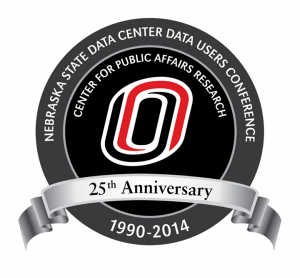 Registration is now open for the 25th Annual Nebraska Data Users Conference, August 19, 8:00 a.m. – 4:30 p.m.
Registration is now open for the 25th Annual Nebraska Data Users Conference, August 19, 8:00 a.m. – 4:30 p.m.
Attend in-person in Omaha or via webcast to learn about the latest data products, methods of access, and applications.
This year’s program includes:
- A special focus on aging and vital statistics.
- Release of the initial results from the 2014 Nebraska Metro and Rural Polls.
- Expanded hands-on computer trainings on American FactFinder, data websites/tools, and data mapping.
- Facilitated lunchtime discussions, back by popular demand.
Attend the conference to learn about:
- Census data basics.
- Powerful online data tools.
- The latest population trends.
- Poverty and the new poverty measure.
- Migration data and brain drain/gain.
- Library resources and STEM.
- Using data to apply for grants or to reach your audience.
Register early for full session options. The hands-on computer trainings have 30-person limits and will fill up fast.
Visit the website or view the attached flier for more details. Register at http://www.unomaha.edu/cpar/register.php.
Autumn 2013 State Publications List Available
For those wanting to add records to their catalogs for Nebraska state documents, the Autumn 2013 list of Nebraska E-Docs is now available at http://nlc.nebraska.gov/govDocs/ShippingLists/edocsalerts.aspx.
Posted in Uncategorized, What's Up Doc / Govdocs
Leave a comment
2014 – 2015 Navigator Funding Announcement
![]() The Centers for Medicare and Medicaid Services (CMS) has announced a recent funding opportunity intended to support Navigators providing health insurance enrollment assistance in Federally-Facilitated and State Partnership Marketplaces in 2014 – 2015. You may learn more about this opportunity here: http://www.grants.gov/web/grants/search-grants.html?keywords=93.332.
The Centers for Medicare and Medicaid Services (CMS) has announced a recent funding opportunity intended to support Navigators providing health insurance enrollment assistance in Federally-Facilitated and State Partnership Marketplaces in 2014 – 2015. You may learn more about this opportunity here: http://www.grants.gov/web/grants/search-grants.html?keywords=93.332.
Many libraries have actively partnered with Navigator organizations in their communities to support outreach, education, and enrollment in the health insurance Marketplace established as part of the Affordable Care Act. Libraries have contributed in many ways, such as providing space for Navigator information sessions, making library computers available for enrollment sessions, and sharing resources from Navigators in person and online. HealthCare.gov defines Navigators as: An individual or organization that’s trained and able to help consumers, small businesses, and their employees as they look for health coverage options through the Marketplace, including completing eligibility and enrollment forms. These individuals and organizations are required to be unbiased. Their services are free to consumers.
You can learn more about Navigators and engaging other community health partners in the Partner Engagement section of WebJunction’s Health Happens in Libraries project site.
25th Annual Data Users Conference
 The Center for Public Affairs Research has announced that the date for the 25th Annual Data Users Conference is TUESDAY, AUGUST 19, 2014. More information about the agenda and registration will be available soon.
The Center for Public Affairs Research has announced that the date for the 25th Annual Data Users Conference is TUESDAY, AUGUST 19, 2014. More information about the agenda and registration will be available soon.
CPAR is a research and community outreach unit of the UNO College of Public Affairs and Community Service. Survey research support is a key component of CPAR’s mission. CPAR is also the lead agency for the Nebraska State Data Center (NSDC) Program. This program is a cooperative program between the U.S. Census Bureau and individual states, and has resulted in CPAR taking an active role in analyzing and disseminating information from the 2010 Census.
The State Data Center (SDC) Program is one of the Census Bureau’s longest and most successful partnerships. It is a cooperative program between the states and the Census Bureau that was created in 1978 to make data available locally to the public through a network of state agencies, universities, libraries, and regional and local governments. The SDCs and their networks are official sources of demographic, economic, and social statistics produced by the Census Bureau.
The NSDC network includes 4 coordinating agencies and 20 affiliate agencies located throughout the state. Download the list of NSDC Affiliates, including phone and email contact information to find an affiliate in your area
The NSDC makes data accessible to state, regional, local and tribal governments, and non-governmental data users at no charge or on a cost-recovery or reimbursable basis as appropriate.
Grant Money Available for Transporting Elderly and Persons with Disabilities
 The Nebraska Department of Roads has announced funds are now available to private nonprofit organizations and governmental entities for transportation needs of elderly persons and persons with disabilities for whom mass transportation services are unavailable, insufficient or inappropriate. Eligible applicants include private nonprofit organizations incorporated within the state and governmental entities. Governmental entities must certify that there are no nonprofit agencies in the service area readily able to provide the service.
The Nebraska Department of Roads has announced funds are now available to private nonprofit organizations and governmental entities for transportation needs of elderly persons and persons with disabilities for whom mass transportation services are unavailable, insufficient or inappropriate. Eligible applicants include private nonprofit organizations incorporated within the state and governmental entities. Governmental entities must certify that there are no nonprofit agencies in the service area readily able to provide the service.
The Federal Transit Administration’s Section 5310 program is a Federal Capital Grant program that requires a local match and is managed by the Department of Roads. The program is designed to provide assistance for purchase of vehicles and related equipment. Applicants may also request funding for operating assistance, purchase of service, and technology.
For further information and to request application forms, contact Wayne Masek at (402) 479-4369 or Kari Ruse at (402) 479-4694, Rail and Public Transportation Division, P.O. Box 94759, Lincoln, NE 68509-4759.
Requests for application forms must be received by 4:30 p.m. on Friday, July 11, 2014.
Doc Spot: Disaster Loans from the Small Business Administration
 Did you know that the SBA provides low-interest disaster loans to homeowners, renters, businesses of all sizes, and most private nonprofit organizations? SBA disaster loans can be used to repair or replace the following items damaged or destroyed in a declared disaster: real estate, personal property, machinery and equipment, and inventory and business assets.
Did you know that the SBA provides low-interest disaster loans to homeowners, renters, businesses of all sizes, and most private nonprofit organizations? SBA disaster loans can be used to repair or replace the following items damaged or destroyed in a declared disaster: real estate, personal property, machinery and equipment, and inventory and business assets.
To find out more, and to apply for a loan, visit SBA.gov Disaster Loans
GRANTS.GOV WEBINAR
 GRANTS.GOV is the Federal Government’s online portal where all 26 Federal grant-making agencies go to post their grant funding opportunities and where applicants go to find and apply for those opportunities. There are three key areas with which applicants must become familiar: the registration process, how to find funding opportunities that match interests, and how to apply for those opportunities.
GRANTS.GOV is the Federal Government’s online portal where all 26 Federal grant-making agencies go to post their grant funding opportunities and where applicants go to find and apply for those opportunities. There are three key areas with which applicants must become familiar: the registration process, how to find funding opportunities that match interests, and how to apply for those opportunities.
A FREE live Webinar, Everything You Want to Know about GRANTS.GOV, from the U.S. Census Bureau, will be offered Wednesday, June 25, 2014.
Register for “Everything You Want to Know about GRANTS.GOV“.
- Start Time: 1:00 pm Eastern Time (12:00 Central)
- Duration: 1 hour
Registration is required. Space is limited on a first-come, first-served basis. Upon registering, an email confirmation of registration will include instructions for joining the webinar.
**ATTENTION! A special note for registrants with mail filters – especially Federal and military agencies**
Upon registration, you should almost immediately receive an email from our eLearning system. If you do not receive that email, it may be that security settings, firewalls, or spam filters prevent the transmission of this and other important notifications from the webinar system. Please notify GPO at FDLPOutreach@gpo.gov if you do not receive a registration confirmation in your email.
Registration confirmations for the webinar will be sent from sqldba@icohere.com. To ensure delivery of registration confirmations, registrants should configure junk mail or spam filter(s) to permit messages from that email address.
VA Fry Scholarship for Surviving Family Members
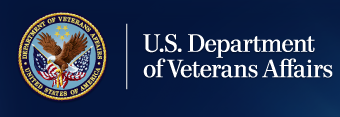 The Department of Veterans Affairs (VA) and TAPS (www.taps.org) recently started working together to ensure surviving family members are connected to their VA benefits. This includes the Marine Gunnery Sergeant John D. Fry scholarship (http://www.benefits.va.gov/gibill/docs/factsheets/fry_scholarship.pdf), which provides Post-9/11 GI Bill education benefits to children of Service members who died in the line of duty after Sept. 10, 2001. The benefit includes full in-state tuition and fees, a monthly housing allowance and a books and supplies stipend.
The Department of Veterans Affairs (VA) and TAPS (www.taps.org) recently started working together to ensure surviving family members are connected to their VA benefits. This includes the Marine Gunnery Sergeant John D. Fry scholarship (http://www.benefits.va.gov/gibill/docs/factsheets/fry_scholarship.pdf), which provides Post-9/11 GI Bill education benefits to children of Service members who died in the line of duty after Sept. 10, 2001. The benefit includes full in-state tuition and fees, a monthly housing allowance and a books and supplies stipend.
By working with non-profit organizations like TAPS helps us stay connected and ensure all eligible dependents know – and use – the Fry Scholarship, hosting economic competitiveness summits across the country, and launching new online employment tools, we continue to work hard to connect transitioning Servicemembers, Veterans and their family members with meaningful employment and rewarding careers.
Additional information can also be found at, http://www.blogs.va.gov/VAntage/14212/program-works-with-va-to-support-family-members/.
SBA Launches Accelerator Competition to Award $2.5 Million for Small Business Startups
 The Small Business Administration (SBA) announced that the SBA is launching a $2.5 million competition for accelerators and other entrepreneurial ecosystem models to compete for monetary prizes of $50,000 each. To award the prizes, an expert panel of judges will consider each applicant’s stated mission, founding team members and business goals among other core components. The deadline for applying is August 2, 2014.
The Small Business Administration (SBA) announced that the SBA is launching a $2.5 million competition for accelerators and other entrepreneurial ecosystem models to compete for monetary prizes of $50,000 each. To award the prizes, an expert panel of judges will consider each applicant’s stated mission, founding team members and business goals among other core components. The deadline for applying is August 2, 2014.
The panel will give particular attention to, and the SBA encourages, applicants that fill geographic gaps in the accelerator and entrepreneurial ecosystem space. It is well known that the most successful accelerators to date were founded on the coasts. Through this competition, we are looking to support the development of accelerators and thus startups in parts of the country where there are fewer conventional sources of access to capital (i.e., venture capital and other investors).
In addition to accelerators which fill the gaps described above, we are also seeking accelerators which are run by and support women or other underrepresented groups. Lastly, special consideration will be given to any accelerator models which support manufacturing.
For the purposes of this competition, Growth Accelerators include accelerators, incubators, co-working startup communities, shared tinker-spaces or other models to accomplish similar goals.
Over the coming months, SBA will be working with a number of partners such as the Global Accelerator Network (GAN) and others to host a number of Demo Days across the country. Demo Days provide opportunities for networking and the sharing of best practices among accelerators and other entrepreneurial ecosystem models. The first Demo Day of 2014 was held in Austin, Texas at the Capital Factory and concurrent with the South by Southwest (SXSW) Festival. Thirteen accelerators across multiple industries and geographies gave five minute pitches to a room full of their peers. SBA is working to develop more of these events to happen in different cities around the country in 2014. Finalists in the competition will also be participating in a Demo Day remotely, thus there is no requirement for applicants to participate in the in-person events.
To apply visit sba.gov or challenge.gov. For additional questions, contact accelerators@sba.gov.
New Government Publications Received at the Library Commission
State government publications ranging from Administrative Services to Nebraska Press, received March and April, 2014.
http://nlc.nebraska.gov/publications/archives/WhatsUpDoc/WUDMarApril2014.pdf
Posted in What's Up Doc / Govdocs
Leave a comment
Health Happens in Libraries: New Resources from WebJunction
Here are the newest resources to support your library’s efforts in connecting patrons with Affordable Care Act and other health information needs!
- Registration is now open for the May 28 webinar from the Health Happens in Libraries team focused on Technology Planning for eHealth (2 PM ET/11 AM PT). You can learn more and register here. We look forward to learning together about how public libraries can leverage their technology infrastructure to better serve the health information needs of patrons!
- Enroll America is hosting a webinar on April 23 on Shifting Gears: The Enrollment Landscape Post-March 31 (2 PM ET/11 AM PT). Learn more and register to join this timely conversation here.
The Health Happens in Libraries team has organized content to support libraries as they continue to help patrons Navigate the Marketplace. Although the official open enrollment period to sign-up for individual healthcare coverage through the Marketplace has ended, libraries can use these resources throughout the year to plan for future enrollment periods, connect with local partners, and to help patrons who may be eligible for special enrollment circumstances.
Webinar Watch: Older. Wiser. Want to start a Business?
 Want to start a business and be your own boss? Be a ‘Boomer-preneur’. Free how-to webinar for 50+ entrepreneurs April 24, 2:00 – 3:00 PST.
Want to start a business and be your own boss? Be a ‘Boomer-preneur’. Free how-to webinar for 50+ entrepreneurs April 24, 2:00 – 3:00 PST.
Small business ownership is an attractive option for many baby boomers who want to do something they care about, are good at and enjoy. And entrepreneurship can be a way to turn a hobby or passion into additional income.
You’re ready for a new challenge …..….. and thinking about starting your own business. There is no time like the present, and now could be YOUR time!
- Find out what it takes to get started, and if owning a business is for you.
- Hear successful over-50 business owners tell how they got their business off the ground.
- Connect with free one-on-one face-to-face counseling to help you get started.
It’s free, but registration is required here: http://over-50nevada.eventbrite.com or call 775-827-4923
To Join the Webinar: 1-888-858-2144 Access Code: 7039554
ALSO: Log on to the website: https://www.teleconference.att.com/servlet/ATTClogin to view the presentation.
Webinar Watch: U.S. Geological Survey Library Access & Outreach
 A live training Webinar, “U.S. Geological Survey Library: Access & Outreach” will be offered Wednesday, May 21, 2014.
A live training Webinar, “U.S. Geological Survey Library: Access & Outreach” will be offered Wednesday, May 21, 2014.
Register today for “U.S. Geological Survey Library: Access & Outreach.”
- Start Time: 2:00 p.m. Eastern Time
- Duration: 60 minutes
- Speaker: Emily Wild
- Summary: The U.S. Geological Survey (USGS) Libraries Program provides access to geoscience print and online information sources, as well as instruction on finding and using the geoscience information. Learn how to find and use USGS publication and data sources available from USGS mission areas, programs, and projects. Highlights include: maps, reports, imagery, datasets, and applications.
Registration is required. Space is limited on a first-come, first-served basis. Upon registering, an e-mail confirmation of registration will include instructions for joining the Webinar.
Registration confirmations for the Webinar will be sent from sqldba @icohere.com. To ensure delivery of registration confirmations, registrants should configure junk mail or spam filter(s) to permit messages from that email address.
Posted in What's Up Doc / Govdocs
Leave a comment
Doc Spot: FRED
 Short for Federal Reserve Economic Data, FRED is an online database consisting of thousands of economic data time series from national, international, public, and private sources. Created and maintained by the Research Department at the Federal Reserve Bank of St. Louis, FRED goes far beyond simply providing data: It combines data with a powerful mix of tools, new and old, that help the user understand, interact with, display, and disseminate the data.
Short for Federal Reserve Economic Data, FRED is an online database consisting of thousands of economic data time series from national, international, public, and private sources. Created and maintained by the Research Department at the Federal Reserve Bank of St. Louis, FRED goes far beyond simply providing data: It combines data with a powerful mix of tools, new and old, that help the user understand, interact with, display, and disseminate the data.
For example, FRED now features new graphs. They are visually more appealing, and also have new capabilities. Users can share graphs easily, embed a graph into a blog, and also now create stacked graphs. If you are interested in seeing it in action, here’s an example of a stacked graph of the components of GDP (GDP = Consumption + Investment + Government + Net Exports).
FRED also has user dashboards. When a user creates an account in FRED, s/he may also create a dashboard of personally selected data. Users can create multiple dashboards, and they may be open to the public or kept private. US Economic Indicators is an example of a public dashboard.
Last, but not least, FRED now has a blog. It will have posts about twice a week, and will highlight interesting data and FRED graph features. It’s a great way to keep up on the latest features and data in FRED.
If you haven’t visited FRED recently (or ever), go take a look–you’ll be glad you did!
Free webinar “New Additions: The Catalog of U.S. Government Publications & Related Service Enhancements” now open for registration
 Register today for the live training webinar “New Additions: The Catalog of U.S. Government Publications & Related Service Enhancements” which will be offered on Thursday, April 10, 2014.
Register today for the live training webinar “New Additions: The Catalog of U.S. Government Publications & Related Service Enhancements” which will be offered on Thursday, April 10, 2014.
- Start Time: 1:00 p.m. Central Time/Noon, Mountain Time
- Duration: 60 minutes
- Summary: Attendees will be guided through a tour of the latest additions and enhancements to the Catalog of U.S. Government Publications. The New Titles feature, FDLP eBooks, and GPO’s MetaLib will all be explored.
Registration is required. Space is limited on a first-come, first-served basis. Upon registering, an e-mail confirmation of registration will include instructions for joining the Webinar.
Registration confirmations for the Webinar will be sent from <sqldba@ icohere.com>. To ensure delivery of registration confirmations, registrants should configure junk mail or spam filter(s) to permit messages from that email address
